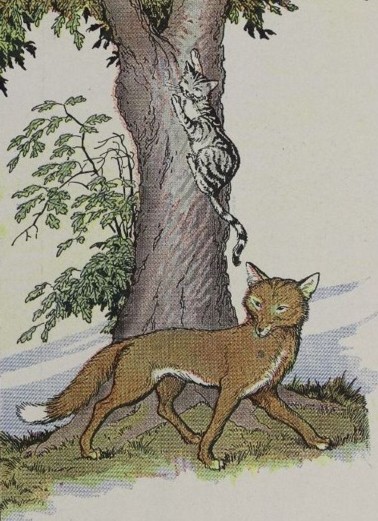PART A_1
Let’s learn vocabulary. Listen and repeat the words and the sentences with your tutor.
PART A_2
| 1. provision | /pruh-VIZH-uhn/ |
| -supplies of food and other necessary things | |
| We went out to buy provisions for the trip. | |
| 2. pretend | /pri-TEND/ |
| -to behave as if something is true when you know that it is not, especially in order to deceive people or as a game | |
| The children pretended (that) they were dinosaurs. | |
| 3. instant | /IN-stuhnt/ |
| -an extremely short period of time | |
| In an instant, she changed her mind. | |
| 4. double | /DUHB-uhl/ |
| -to become twice as much or as many, or to make something twice as much or many | |
| Their profits have doubled when they changed their marketing plans. | |
| 5. vain | /veyn/ |
| -unsuccessfully | |
| All the police’s efforts to find him were in vain. |
PART B_1
Let’s read the story. Please read them aloud, and I will check your pronunciation and intonation.
PART B_2
The Cat and the Fox

Once a Cat and a Fox were traveling together. As they went along, picking up provisions on the way—a stray mouse here, a fat chicken there—they began an argument to while away the time between bites. And, as usually happens when comrades argue, the talk began to get personal.
“You think you are extremely clever, don’t you?” said the Fox. “Do you pretend to know more than I? Why, I know a whole sackful of tricks!”
“Well,” retorted the Cat, “I admit I know one trick only, but that one, let me tell you, is worth a thousand of yours!”
Just then, close by, they heard a hunter’s horn and the yelping of a pack of hounds. In an instant the Cat was up a tree, hiding among the leaves.
“This is my trick,” he called to the Fox. “Now let me see what yours are worth.”
But the Fox had so many plans for escape he could not decide which one to try first. He dodged here and there with the hounds at his heels. He doubled on his tracks, he ran at top speed, he entered a dozen burrows,—but all in vain. The hounds caught him, and soon put an end to the boaster and all his tricks.
Common sense is always worth more than cunning.
“You think you are extremely clever, don’t you?” said the Fox. “Do you pretend to know more than I? Why, I know a whole sackful of tricks!”
“Well,” retorted the Cat, “I admit I know one trick only, but that one, let me tell you, is worth a thousand of yours!”
Just then, close by, they heard a hunter’s horn and the yelping of a pack of hounds. In an instant the Cat was up a tree, hiding among the leaves.
“This is my trick,” he called to the Fox. “Now let me see what yours are worth.”
But the Fox had so many plans for escape he could not decide which one to try first. He dodged here and there with the hounds at his heels. He doubled on his tracks, he ran at top speed, he entered a dozen burrows,—but all in vain. The hounds caught him, and soon put an end to the boaster and all his tricks.
Common sense is always worth more than cunning.
PART C_1
Let’s answer comprehension questions. Please answer them based on the story.
PART C_2
| 1. | What were the Cat and the Fox doing along the way? |
| 2. | According to the story, what usually happens when comrades argue? |
| 3. | Where did the Cat hide? Did the hounds find him? |
PART D_1
Let’s discuss the story. Please answer the questions below and express your opinions.
PART D_2
| 1. | Why do you think the Cat and the Fox usually argue? |
| 2. | Do you think it is normal for comrades to argue? Why do you think so? |
| 3. | Would the Fox be able to hide successfully if he were given more time? |
| 4. | How do you know if someone lacks common sense? |
| 5. | Are there any instances wherein cunning is worth more than common sense? Please tell me about it. |
REVIEW AND FEEDBACK
Now, let us review the things that you learned in this lesson.
ではこのレッスンで学んだことを振り返りましょう。
(Please give a short feedback on how your student did on your class.)
| Grammar 文法 |
Pronunciation 発音 | Vocabulary 単語 |
Comprehension 理解 |
|
|---|---|---|---|---|
 GOOD GOOD |
文法の誤りはほとんどなく、完全な文章で話すことができる | ほとんどの単語をはっきりと正しく発音することができる | 習った表現を適切に使うことができる | 文章を理解し、質問に正しく答えることができる |
 FAIR |
文法の誤りはあるが、完全な文章で話すことができる | 発音の練習が必要な言葉がいくつかある | たまにミスはあるが、習った表現を適切に使うことができる | 文章を完全に理解するのは難しく、質問に正しく答えられないときもある |
 POOR |
文章で話すのは難しく、単語だけで話すことができる | 発音の練習が必要である | 習った単語と表現を少しだけ使うことができる | 文章を理解するのは難しく、質問に答えるのは難しい |
Parts of this lesson material are based on:
An eBook from The Project Gutenberg.
This eBook is for the use of anyone anywhere at no cost and with almost no restrictions whatsoever. You may copy it, give it away or re-use it under the terms of the Project Gutenberg License included with this eBook or online at www.gutenberg.org
An eBook from The Project Gutenberg.
This eBook is for the use of anyone anywhere at no cost and with almost no restrictions whatsoever. You may copy it, give it away or re-use it under the terms of the Project Gutenberg License included with this eBook or online at www.gutenberg.org